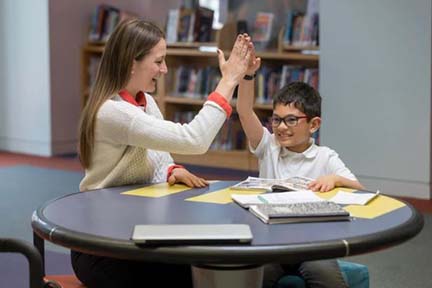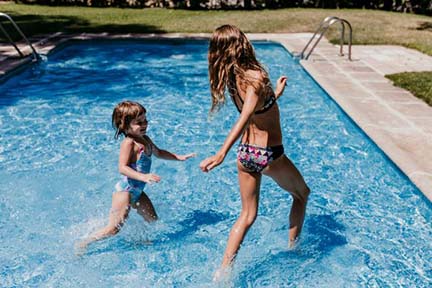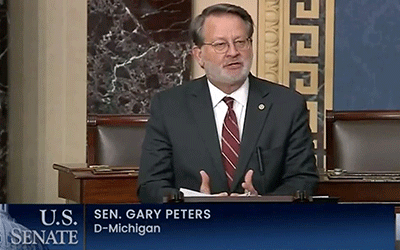
by Becky Andrus | May 25, 2022 | Regional News

Gov. Whitmer Proposes “MI Kids Back on Track” Tutoring Plan
Plan would invest additional state revenue to get students caught up and on track for long-term success
LANSING, Mich. – Today, Governor Gretchen Whitmer introduced the MI Kids Back on Track, a plan to expand tutoring and other learning supports across the state. The proposal would invest $280 million of Michigan’s $3 billion in additional revenue to tackle unfinished learning after a tough few years with tutoring or other forms of personalized instruction before, after, or during school.
“The MI Kids Back on Track program would double down on tackling unfinished learning by investing in what our kids need most,” said Governor Gretchen Whitmer. “For lots of kids, this means extra personalized instruction, like tutoring, which is a critical tool for parents to help their kids get caught up and on the right track after a tough few years. In a tutoring setting, students get help from a caring, qualified adult who is focused on their specific learning challenges. Whether you’re a third grader learning about the solar system, a 6th grader getting better at fractions, or a junior sharpening persuasive writing skills—tutoring makes a difference. If we get this done, we can offer every student in Michigan—all 1.4 million of them—extra help with a qualified tutor. But tutoring programs only work if we have tutors. I am calling on my fellow Michiganders who want to see our kids succeed to join the effort to get our kids back on track.”
“Our schools have been amazing, but the disruption of the pandemic continues to have an adverse impact on students,” said Beth Hulett, Parent and PTA state board member. “I’m grateful to Governor Whitmer for investing more time, energy, and resources in education to ensure all students have the supports they need to succeed and thrive.”
“It’s no secret that the last few years have presented unprecedented challenges for students, educators, and parents across our state. We are fortunate in our district to have added multiple additional positions to support student recovery efforts, including additional counseling staff and academic interventionist positions,” said Paul Gaudard, Superintendent of Kearsley Schools. “Despite these supports, we know more assistance and resources are needed. I am hopeful that we can continue to work collaboratively and creatively with all stakeholders to ensure our students’ road to recovery is as quick as possible. I am excited about Governor Whitmer’s MI Back on Track Program and welcome support to help our kids succeed.”
“There are times when students need more instruction than the typical school day. After school tutoring and enrichment programs are a great way to meet that need. I have had the opportunity to run several afterschool programs,” said Rachel Huiskens, 5th grade teacher at Fiedler Elementary. “Tutoring was a chance for me to build a special relationship with kids who need extra support and personalized instruction. The impact I saw on children from those programs included social, emotional, cognitive, and academic growth. After school programs such as these provide a safe, supportive environment for students to learn, grow and build relationships. I look forward to Governor Whitmer’s MI Back on Track Program, and seeing the impact it will make for the kids in Michigan.”
Governor Whitmer’s MI Kids Back on Track plan would invest Michigan’s additional revenue to help students catch up and get on track for long-term success after a tough few years. Michigan schools have already received federal resources from the American Rescue Plan specifically to address unfinished learning. MI Kids Back on Track would build on this funding with state resources to bolster tutoring programs. The plan will help schools process background checks for potential tutors and pay them.
Michiganders who want to join the effort can sign up here.
Governor Whitmer’s Education Investments
For three years straight, Governor Whitmer has worked across the aisle to make the largest education investments in Michigan history—without raising taxes. Since taking office, she’s tripled the number of literacy coaches and last year, she signed an education budget that closed the funding gap between schools, boosted per-student investment to an all-time high, and helped districts hire hundreds of on-campus mental health professionals.
The Governor’s education budget proposal for this year, includes the highest per-student investment ever, $1 billion for school construction and renovation, funds to hire and retain 15,000 teachers, and more resources for on-campus mental health support.
The Whitmer-Gilchrist administration’s education accomplishments can be found here.
Michigan’s $3 Billion in Additional Revenue
Thanks to hardworking people, innovative small businesses, and effective fiscal management, Michigan has $3 billion in additional revenue. Governor Whitmer proposed MI Tax Rebate Right Now, a plan to return a portion of the additional revenue to Michiganders by sending $500 to working families as they face rising prices on groceries, gas, and other everyday expenses.



|

by Becky Andrus | May 25, 2022 | Health and Wellness
|
Press Release
FOR IMMEDIATE RELEASE: May 23, 2022
CONTACT: Lynn Sutfin, 517-241-2112, SutfinL1@michigan.gov
MDHHS alerts caregivers about new Safe Sleep for Babies Act
prohibiting sale of crib bumper pads and inclined sleepers
LANSING, Mich. – The Michigan Department of Health and Human Services (MDHHS) is praising a new federal law that will improve efforts to make sure infants sleep in a safe environment.
The Safe Sleep for Babies Act, signed by President Joe Biden last week, makes it illegal to sell padded bumper pads and inclined sleepers for infants. The law does not include unpadded, mesh crib liners.
“The Safe Sleep for Babies Act will save the lives of Michigan babies,” said Dr. Alexis Travis, senior deputy director of the MDHHS Public Health Administration. “Parents see these items in stores and may think they are safe for their baby when they are not. These products have been involved in hundreds of infant deaths and we are grateful they will no longer be sold. Educating parents and other caregivers about the importance of infant safe sleep remains a top priority for MDHHS.”
In addition to not using crib bumpers and inclined sleepers, babies from birth to age 1 can be kept safe while sleeping at night and during naps by following the American Academy of Pediatrics recommendations to:
- Place baby on back, in a crib, bassinet or pack ’n play on their own with no other people for every sleep time. If baby falls asleep in an unsafe sleep space, baby should be moved to a crib, bassinet or pack ’n play as soon as possible.
- Use a firm mattress with a tightly fitted sheet.
- Keep baby’s sleep space clutter-free – no pillows, blankets, toys or bumper pads.
- Avoid covering baby’s head or overheating. Instead of a blanket use a sleep sack, wearable blanket or footed sleeper to keep baby warm.
- Remind everyone who cares for baby, including babysitters and family members, how to keep baby safe while sleeping.
- Keep baby in a smoke-free environment.
- Support breastfeeding and immunizations.
From 2010 to 2019, 1,436 Michigan babies died due to sleeping in unsafe environments, such as on an adult bed, couch, sofa chair or other unsafe sleep place with toys, blankets or bumper pads, according to the Centers for Disease Control and Prevention Sudden Unexpected Infant Death Case Registry and the Michigan Public Health Institute.
MDHHS encourages caregivers to make sure their babies are sleeping in a safe product. Parents can use the checklist Is this Infant Safe Sleep? to determine if a product is safe for infant sleep. Parents can also make sure unsafe products get taken off the market by reporting them to the Consumer Product Safety Commission. Anyone can report a concern, whether it’s an injury, death or a “near miss” at Saferproducts.gov.
To learn more about infant safe sleep, visit Michigan.gov/SafeSleep or contact the Infant Safe Sleep Program at MDHHS-InfantSafeSleep@michigan.gov. To view data related to sleep-related infant deaths, visit Keepingkidsalive.org/publications. |

by Becky Andrus | May 25, 2022 | Health and Wellness
|
Press Release
FOR IMMEDIATE RELEASE: May 23, 2022
CONTACT: Chelsea Wuth, 517-241-2112, [email protected]
MDHHS is reminding Michigan residents how to stay safe in the water this summer during Healthy and Safe Swimming Week
LANSING, Mich. – The Michigan Department of Health and Human Services (MDHHS) is encouraging residents to maximize the health benefits of swimming while practicing safe and healthy habits. Each of us has a role in preventing illnesses and injuries when we swim, play and relax in the water — during the summer and year-round. As part of these efforts, MDHHS is recognizing May 23-29 as Healthy and Safe Swimming Week.
“Everyone plays a role in preventing pool-related illnesses, injuries and deaths,” said Dr. Natasha Bagdasarian, chief medical executive for MDHHS. “Use proper hygiene when maintaining and using pools, make sure you and loved ones have basic swimming and water safety skills when partaking in water sports, and prevent access to backyard pools when not supervised.”
Between 2012 and 2021, 19 outbreaks reported in Michigan were linked to swimming in treated and untreated water locations including pools, hot tubs and freshwater lakes. More than 713 estimated recreational water illnesses including illness due to E. coli and Legionella (confirmed or suspected) were reported — likely an underestimate.
It’s also important to prevent pool-related injuries, such as drowning or those caused by mishandling pool chemicals. Drowning is the second leading cause of unintentional injury death for children ages 1 to 4. In the Great Lakes, over 1,000 drownings have occurred between 2010 and 2021.
Here’s what you can do to keep your family safe and healthy this swimming season:
Keep germs out of the water and out of your body.
- Don’t swallow the water.
- Stay out of the water if you have diarrhea.
- Shower before you get in the water.
- Don’t pee or poop in the water.
- Take children on bathroom breaks or check diapers every hour. Change diapers away from the water to keep germs from getting in.
Keep swimmers and boaters safe in the water.
- Make sure everyone has basic swimming and water safety skills.
- Use U.S. Coast Guard-approved life jackets appropriately.
- Choose a responsible adult to provide continuous, attentive supervision close to swimmers.
- Know how to recognize and respond to a swimmer in distress and how to perform CPR.
- Prevent access to backyard pools when not supervised.
- Get your boating safety certificate (required for boaters born after June 30, 1996, and most personal watercraft operators). Click on “Boating Safety Certificate” at Michigan.gov/Boating.
Use chemicals safely in your pools.
- Read and follow directions on product labels.
- Open chemical containers safely, using proper protective equipment, in a well-ventilated area.
- NEVER mix different pool chemicals with each other, especially chlorine products with acid. Add the pool chemical to water, never add water to pool chemical.
- Store pool chemicals securely.
For more information and safety tips on preventing swimming illness and injury, visit Cdc.gov/HealthyWater/Swimming. |

by Becky Andrus | May 25, 2022 | Regional News
|
|
|
|
Friend –
I have long believed that you cannot be a great country if you don’t make things.
But for far too long we have relied on foreign competitors for critical goods and products that our companies and workers need to be successful. We’re seeing it now with the semiconductor chip shortage.
It’s something I’ve been focused on addressing in the Senate – particularly as the Chairman of the Homeland Security and Governmental Affairs Committee – and that’s why I’m honored to be serving on the conference committee tasked with finalizing the U.S. economic competitiveness legislation that has passed both the House and Senate.
At the first meeting of this bipartisan, bicameral committee, I stressed the need to invest in domestic semiconductor chip production – and fully fund the CHIPS Act to prevent another shortage like the one we are experiencing now.

To watch video of my remarks at the conference committee’s first meeting, click here.
The Senate-version of this legislation that I helped pass last year includes $50 billion to increase production of semiconductors – and I added an additional $2 billion in new funding for mature semiconductor technologies that critical manufacturing industries – like the auto industry – rely on.
I can’t stress enough that a strong economic competitiveness bill is key to ensuring that we can create jobs, outcompete anyone on the global stage – including the Chinese government – and continue to lead in manufacturing both in Michigan and across the country.
That’s why I am honored to be serving on the conference committee and look forward to getting this vital legislation signed into law as quickly as possible.
Thanks for reading,

Gary Peters
United States Senator for Michigan |
|
|

by Becky Andrus | May 25, 2022 | Local News
FOR IMMEDIATE RELEASE
Contact: Prem Mukherjee
Email: [email protected]
Grants to be awarded to children’s based charities by local renowned
fine art portrait studio.
LAKE ORION, MI — Arising Images, a local Lake Orion portrait studio, is offering an opportunity to submit applications for a charitable grant. Organizations must be a 501(c) 3 within 75 miles of the Lake Orion community and provide programs and/or services that focus on children. Multiple grants between $15k-$30k will be awarded.
Locally owned and operated by Prem and Cheridy Mukherjee since 2004, Arising Images is excited to open up this donation opportunity to the many worthy causes in the area. Prem says, “Supporting the mission of the good people doing the good works of providing programs & services to children in the community really aligns with our vision to help kids realize they are valued and important. By capturing their strength and inner beauty through portraits, our goal is always to reinforce their self-worth and build confidence. We also know that the process for applying and obtaining grants can be challenging for smaller charities so we have made the process to apply and be considered very simple. It really just seemed like a great marriage of our values.”
To be considered for a donation, organizations will submit an application on or before the deadline of July 31, 2022. After careful review, finalists will be notified and invited to do a short, in-person presentation at a date/time to be announced.
Complete submission criteria and application link is available at: https://arisingimages.com/grant_application/; Arising Images FB; or request by email at [email protected]. For more information, please call 248-720-5848.
About Arising Images
Arising Images, a Michigan boutique studio, specializes in children’s fantasy portraits that capture their innocence and amazement with mystical forest friends and magic in a lush realistic forest setting. Fine Art Photographer’s provide artistic images and heirloom quality products that last a lifetime and create a memorable family experience.











